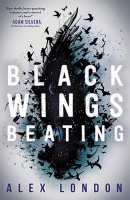2018 School Spending Survey Report
Fall 2018 Publishers' Preview: Five Questions for Alex London
This interview originally appeared in the September/October 2018 Horn Book Magazine as part of the Fall 2018 Publishers’ Previews, an advertising supplement that allows participating publishers a chance to each highlight a book from its current list.

This interview originally appeared in the September/October 2018 Horn Book Magazine as part of the Fall 2018 Publishers’ Previews, an advertising supplement that allows participating publishers a chance to each highlight a book from its current list. They choose the books; we ask the questions.
Sponsored by

Birds of prey provide the theology in Black Wings Beating, an epic fantasy in which a brother and sister may prevent — or bring on — a savage war.
 Photo: Sonya Sones.
Photo: Sonya Sones.1. Why did no one ever name the Nameless Gap?
They did! One of the things I loved about writing this novel was inventing geography. While I based the landscape on the Himalayas, you’d have to ask the ancient (fictional) mountaineers of the Uztari Plateau why they called that spot the Nameless Gap. I’m sure there’s some good mountaineer lore around it.
2. Gay love triangle! Did you know how you were going to conclude that when you began?
Nope. In fact, I still don’t know where the wild strivings of Brysen’s fragile heart will take him.
 3. There are some interesting parallels to contemporary real-world fundamentalism here — was that on purpose or did it creep up on you?
3. There are some interesting parallels to contemporary real-world fundamentalism here — was that on purpose or did it creep up on you?It was deliberate, but not meant to be an allegory for anything. I knew that the book’s bird-cult fanatics would draw parallels to the contemporary fanatics our world grapples with, but I began, in truth, with Europe’s Thirty Years’ War and the schisms of faith, territory, and power that provoked it. I didn’t want to import today’s news into my fantasy world, but fanaticism tends to share traits across faiths, histories, and geographies.
4. What’s the closest you’ve gotten to a raptor?
I spent some time with a Master Falconer in rural Pennsylvania. He let me carry a Harris’s hawk on my fist, toss it to the sky, and call it back a few times. They are surprisingly light for mini flying dinosaurs that can crush a rabbit’s skull with their feet. That’s what fascinates me about raptors — their amazing fragility, the vicious intelligence of their eyes, and their gift for shocking violence.
5. Can the falcon hear the falconer, or was Yeats right?
I love Yeats’s poem of societal collapse. But on a biological level, the real danger would be when the falcon can no longer see the falconer. The piece of poetic falconry I was most inspired by was Thom Gunn’s “Tamer and Hawk.” Its final lines hold clues to where this queer, giant-killer-bird epic of mine is going.
Sponsored by

RELATED
RECOMMENDED
ALREADY A SUBSCRIBER? LOG IN
We are currently offering this content for free. Sign up now to activate your personal profile, where you can save articles for future viewing.







Add Comment :-
Be the first reader to comment.
Comment Policy:
Comment should not be empty !!!